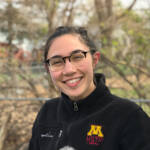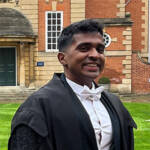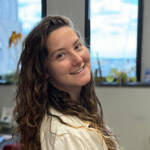This year, we asked early-career scientists and health professionals to identify a scientific question that is insufficiently addressed in biomedical research today. The winning essays are published in the July 15th issue of The Journal of Clinical Investigation.

After reading their essays, we were excited to learn more about our winners. Watch the interviews to find out who inspires them, what is the best part of doing research, and what the next big thing in their field will be.

Kevin S. Blake, Washington University in St. Louis
Kevin received his PhD in biology and biomedical sciences from Washington University in St. Louis. He investigates the diversity and evolution of antibiotic resistance in human and environmental microbiomes, with a focus on the sequence–structure–function dynamics of the tetracycline destructase family of antibiotic-inactivating enzymes. He is interested in writing about science for general audiences. In his free time, he enjoys running, reading, and playing with his dog.
Essay: Missing microbiomes: global underrepresentation restricts who research will benefit
Who inspires you as a scientist?
Kevin is inspired by two scientists: Michael Baym and Stephen Jay Gould.
What is your favorite part about doing research?
Kevin loves doing experiments.
What do you think is next in your field, or in what direction do you hope it will go?
Kevin shares his hopes for microbiome-based therapeutics.

Catherine M. Bridges, Lexington Medical Center in West Columbia; Medical University of South Carolina
Catherine earned her MD/PhD from the Medical University of South Carolina, where she studied the role of microglia in a mouse model of MEF2C haploinsufficiency syndrome (a rare neurodevelopmental disorder). She is a transitional-year intern at Lexington Medical Center in West Columbia, South Carolina. She matched into residency in diagnostic radiology. Her research interests involve applying radiological techniques in women’s health. In her free time, she enjoys spending time with her husband, playing board games, and gardening.
Essay: Illuminating maternal sepsis: a call for improved recognition and prevention
When are you inspired as a scientist?
Catherine shares how patients inspire her research.
What is your favorite part about doing research?
Catherine is excited when she sees the results of an experiment.
What do you think is next in your field, or in what direction do you hope it will go?
Catherine hopes there will be increased attention and broader accessibility to women’s health.

Andrea M. Maxwell, University of Minnesota Medical School
Andrea is a sixth-year MD/PhD student at the University of Minnesota. Her thesis work focuses on sex/gender differences in the roles of social support, stress, and brain function in alcohol misuse. She plans to pursue clinical training in psychiatry, focusing on addiction and reproductive psychiatry. Outside work, she likes to camp, travel, take care of her backyard chickens, and read and write for fun.
Who inspires you as a scientist?
Andrea was inspired by Dr. Sylvia Earle, whom she discovered in a book that her parents gave her when she was a child.
What is your favorite part about doing research?
Andrea enjoys working with an interdisciplinary team and writing about science.
What do you think is next in your field, or in what direction do you hope it will go?
Andrea explains that deep data collection will help us understand complex pathologies such as substance use disorder during pregnancy.

Subashan Vadibeler, University of Leeds; University of Oxford, UK
Subashan is a doctor at St. James’s University Hospital, where he researches health inequities. Born and raised in Malaysia, he attended medical school at the University of Malaya, during which he developed an interest in urban poverty, child health, and the immune system. He later matriculated at Oxford University, where he researched immune evasion mechanisms in cancers and viruses. He aspires to become a clinician–scientist working toward solutions for tropical infectious diseases. He finds balance through long-distance running.
Who inspires you as a scientist?
Subashan shares how the high prevalence of dengue disease in Malaysia directed his research focus.
What is your favorite part about doing research?
Subashan enjoys being challenged and tackling novel scientific questions.
What do you think is next in your field, or in what direction do you hope it will go?
Subashan is optimistic that increased attention to tropical infectious diseases will advance the field.

Sarah Voss, Johns Hopkins School of Medicine
In the suburbs of Fort Worth, Texas, Sarah spent her childhood as a nationally ranked springboard diver until she hopped off the diving board and into the research lab. Her undergraduate research experiences catapulted her into PhD work at Johns Hopkins School of Medicine, where she studies bacterial defense systems and fundamental phage biology. In her free time, she loves to paint, rock climb, and practice yoga.
Who inspires you as a scientist?
Sarah chose Jane Goodall as a role model.
What is your favorite part about doing research?
Sarah loves discussing science and sharing ideas with her peers.
What do you think is next in your field, or in what direction do you hope it will go?
Sarah tells us what is next in phage therapy research.
